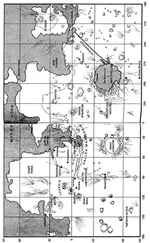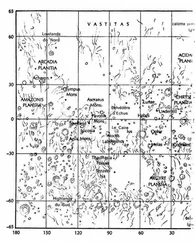“What he proposes could be very dangerous,” Frank said. “If we explicitly disregard a directive from the U.N., they could conceivably come here and round us up and ship us home, and replace us with people who will pay attention to the law. I mean, biological contamination of this environment is simply illegal at this point, and we don’t have the right to ignore that. It’s international treaty. It’s how humanity in general wants to treat this planet at this time.”
“Can’t you talk to him?” Maya asked.
“I can talk to him,” Nadia said. “But I can’t say that it will do any good.”
“Please, Nadia. Just try. We’ve got enough problems as it is.”
“I’ll try, sure.”
So that afternoon she talked to Arkady. They were out on Chernobyl Road, walking back toward Underhill. She brought it up, and suggested that patience was in order. “It will only be a matter of time before the U.N. comes around to your view anyway.”
He stopped and lifted her maimed hand. “How long do you think we have?” he said. He pointed at the setting sun. “How long do you suggest we wait? For our grandchildren? Our great-grandchildren? Our great-great-grandchildren, blind as cave fish?”
“Come on,” Nadia said, pulling her hand free. “Cave fish.”
Arkady laughed. “Still, it’s a serious question. We don’t have forever, and it would be nice to see things start to change.”
“Even so, why not wait a year?”
“A Terran year or a Martian year?”
“A Martian year. Get readings on all the seasons, give the U.N. time to come around.”
“We don’t need the readings, they’ve been taken now for years.”
“Have you talked to Ann about that?”
“No. Well, sort of. But she doesn’t agree.”
“A lot of people don’t agree. I mean maybe they will eventually, but you have to convince them. You can’t just run roughshod over opposing opinions, otherwise you’re just as bad as the people back home that you’re always criticizing.”
Arkady sighed. “Yeah yeah.”
“Well, aren’t you?”
“You damned liberals.”
“I don’t know what that means.”
“It means you’re too soft-hearted to ever actually do anything.”
But they were now within sight of the low mound of Underhill, looking like a fresh squarish crater, its ejecta scattered around it. Nadia pointed at it. “I did that. You damned radicals—” she jabbed him in the ribs with her elbow, hard—”you hate liberalism because it works.”
He snorted.
“It does! It works in increments, over time, after hard labor, without fireworks or easy dramatics or people getting hurt. Without your sexy revolutions and all the pain and hatred they bring. It only works .”
“Ah, Nadia.” He put his arm over her shoulders, and they started walking again toward base. “Earth is a perfectly liberal world. But half of it is starving, and always has been, and always will be. Very liberally.”
• • •
Still, Nadia seemed to have affected him. He quit calling for a unilateral decision to release the new GEMs onto the surface, and he confined the agitprop to his beautification program, spending much of his time in the Quarter, trying to make colored bricks and glass. Nadia joined him for a swim before breakfast on most days, and along with John and Maya they took over a lane in the shallow pool that filled all of one of the vaulted chambers, and swam a brisk workout of one or two thousand meters. John led the sprint sets, Maya led the distance sets, Nadia followed in everything, hampered by her bad hand, and they churned through the extra-splashy water like a line of dolphins, staring through their goggles down at the sky-blue concrete of the pool bottom. “The butterfly was made for this g,” John would say, grinning at the way they could practically fly out of the water. Breakfasts afterward were pleasant if brief, and the rest of the days were the usual round of work; Nadia seldom saw Arkady again till evenings at dinner, or afterward.
Then Sax and Spencer and Rya finished setting up the robot factory for making Sax’s windmill heaters, and they applied to UNOMA for permission to distribute a thousand of them around the equatorial regions, to test their warming effect. All of them together were only expected to add about twice the heat to the atmosphere that Chernobyl did, and there were even questions as to whether they would be able to distinguish the added heat from background seasonal fluctuations— but as Sax said, they wouldn’t know until they tried.
And so the terraforming argument flared again. And suddenly Ann flew into violent action, taping long messages that she sent to the members of UNOMA’s executive committee, and to the national offices for Martian affairs for all the countries that were currently on the committee, and finally to the U.N. General Assembly. These appearances were given enormous amounts of attention, from the most serious policy-making levels all the way down to the tabloid press and TV, media that regarded it as the newest episode of the red soap opera. Ann had taped and sent her messages in private, so the colonists learned of them when excerpts were shown on Terran TV. The reaction in the days that followed included debates in government, a rally in Washington that drew 20,000, endless amounts of editorial space, and commentary in the scientific nets. It was a bit shocking to see the strength of these responses, and some colonists felt that Ann had gone behind their backs. Phyllis for one was outraged.
“Besides, it doesn’t make sense,” Sax said, blinking rapidly. “Chernobyl is already releasing almost as much heat into the atmosphere as these windmills, and she never complained about that.”
“Yes she did,” Nadia said. “She just lost the vote.”
Hearings were held at UNOMA, and while they were going on a group of the materials scientists confronted Ann after dinner. A lot of the rest of them were there to witness this confrontation; Underhill’s main dining hall filled four chambers, whose dividing walls had been removed and replaced by load-bearing pillars; it was a big room, filled with chairs and potted plants and the descendants of the Ares ‘ birds, and most recently lit by windows installed high across the northern wall, through which they saw the ground-level crops of the atrium. A big space; and at least half the colonists were in it eating when the meeting took place.
“Why didn’t you discuss this with us?” Spencer asked her.
Ann’s glare forced Spencer to look away. “Why should I discuss it with you?” she said, turning her gaze on Sax. “It’s clear what you all think about this, we’ve gone over it many times before, and nothing I’ve said makes any difference to you. Here you sit in your little holes running your little experiments, making things like kids with a chemistry set in a basement, while the whole time an entire world sits outside your door. A world where the landforms are a hundred times larger than their equivalents on Earth, and a thousand times older, with evidence concerning the beginning of the solar system scattered all over, as well as the whole history of a planet, scarcely changed in the last billion years. And you’re going to wreck it all. And without ever honestly admitting what you’re doing, either. Because we could live here and study the planet without changing it— we could do that with very little harm or even inconvenience to ourselves. All this talk of radiation is bullshit and you know it. There’s simply not a high enough level of it to justify this mass alteration of the environment. You want to do that because you think you can. You want to try it out and see— as if this were some big playground sandbox for you to build castles in. A big Mars jar! You find your justifications where you can, but it’s bad faith, and it’s not science .”
Читать дальше
Конец ознакомительного отрывка
Купить книгу












